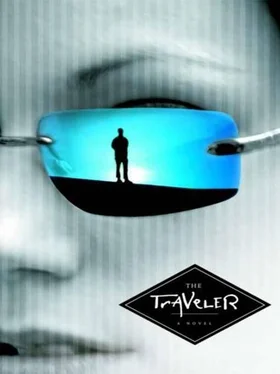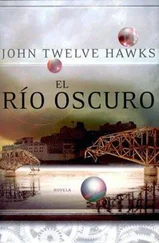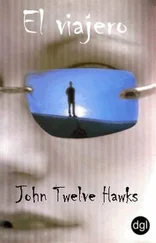“And that’s how the Tabula found you,” Maya said.
“Maybe, but who knows? A few more years went by and nothing happened to us. When I was twelve and Michael was sixteen, we were sitting in the kitchen doing our homework after dinner. It was January and real cold outside. Then Minerva came through the trapdoor and sat there hooting and blinking at the light.
“This had happened a couple of times before when the Stevensons’ dog hit the trip line. I got on my boots and went outside to find the dog. I came around the corner of the house, looked down the hill, and saw four men come out of the spruce trees. All of them wore dark clothes and carried rifles. They talked to each other, split apart, and began walking up the hill.”
“Tabula mercenaries,” Maya said.
“I didn’t know who they were. For a few seconds I couldn’t move, then I ran into the house and told my family. Father went upstairs to the bedroom and came down with a duffel bag and the jade sword. He gave the sword to me and the duffel bag to my mother. Then he handed the shotgun to Michael and told us to go out the back door and hide in the root cellar.
“‘What about you?’ we asked.
“‘Just go to the cellar and stay there,’ he told us. ‘Don’t come out until you hear my voice.’
“Father grabbed the rifle and we went out the back door. He told us to walk by the fence so we wouldn’t leave footprints in the snow. I wanted to stay and help him, but Mother said we had to go. When we reached the garden, I heard a gunshot and a man shouting. It wasn’t my father’s voice. I’m sure about that.
“The root cellar was just a dumping place for old tools. Michael pulled the door open and we climbed down the staircase to the cellar. The door was so rusty that Michael couldn’t shut it all the way. The three of us sat there in the darkness, on a concrete ledge. For a while we heard gunfire and then it was quiet. When I woke up, sunlight was coming through the crack around the door.
“Michael pushed the door open and we followed him out. The house and barn had burned down. Minerva was flying above us as if she was searching for something. Four dead men lay in different places-twenty or thirty yards away from each other-and their blood had melted the snow around them.
“My mother sat down, wrapped her arms around her legs, and began crying. Michael and I checked what was left of the house, but we didn’t find any trace of our father. I told Michael that the men didn’t kill him. He ran away.
“Michael said, ‘Forget that. We better get out of here. You’ve got to help me with Mom. We’ll go over to the Tedfords and borrow their station wagon.’
“He went back into the root cellar and returned with the jade sword and the duffel bag. We looked inside the duffel and saw that it was filled with packets of one-hundred-dollar bills. Mother was still sitting in the snow, crying and whispering to herself like a crazy woman. Carrying the weapons and the bag, we took her across the fields to the Tedfords’ farm. When Michael pounded on the front door, Don and Irene woke up and came downstairs in their bathrobes.
“I’d heard Michael lie hundreds of times at school, but no one ever believed his stories. This time, he sounded like he believed what he was saying. He told the Tedfords that our father had been a soldier and he had run away from the army. Last night, government agents had burned down our house and killed him. The whole thing sounded crazy to me, but then I remembered that the Tedfords’ son had been killed in the war.”
“A skillful lie,” Maya said.
“You’re right. It worked. Don Tedford loaned us his station wagon. Michael had already been driving for a couple of years on the farm. We loaded up the weapons and the duffel bag, then headed down the road. Mother lay on the backseat. I covered her with a blanket and she went to sleep. When I looked out the side window, I saw Minerva flying through the smoke up in the sky…”
Gabriel stopped talking and Maya stared at the ceiling. A truck came down the highway and its headlights cut through the window blinds. Darkness again. Silence. The shadows that surrounded them seemed to gain substance and weight. Maya felt like they were lying together at the bottom of a deep pool.
“And what happened after that?” she asked.
“We spent a few years driving around the country, and then we got fake birth certificates and lived in Austin, Texas. When I was seventeen, Michael decided that we should move to Los Angeles and start a new life.”
“Then the Tabula found you and now you’re here.”
“Yes,” Gabriel said softly. “Now I’m here.”
Boone didn’t like Los Angeles. It was ordinary enough on the surface, but there was an impulse toward anarchy. He remembered watching a video of a riot in the ghetto neighborhoods. Smoke rising to a sunny sky. A palm tree bursting into flames. There were a great many street gangs in Los Angeles and most of the time they just tried to kill each other. That was acceptable. But a visionary leader, like a Traveler, could stop the drugs and direct the anger outward.
He took the freeway south to Hermosa Beach, left his car in a public lot, and walked over to Sea Breeze Lane. A power company repair van was parked across the street from the Indian’s house. Boone knocked on the van’s rear door, and Prichett pulled up the shade that covered the window. He smiled and nodded eagerly-glad you’re here. Boone opened the door and climbed inside.
The three Tabula mercenaries were sitting in low beach chairs set up in the back of the van. Hector Sanchez was a former Mexican federale who had gotten involved in a bribery scandal. Ron Olson was an ex-military policeman who had been accused of rape.
The youngest of the group was Dennis Prichett. He had short brown hair, a chubby face, and a polite but earnest manner that made him seem like a young missionary. Prichett went to church three times a week and never used foul language. During the last few years, the Brethren had started to hire true believers from different religions. Although they were paid like mercenaries, they joined the Brethren for moral reasons. As far as they were concerned, the Travelers were false prophets who challenged whatever they considered to be the true faith. These new employees were supposed to be more dependable and ruthless than the regular mercenaries, but Boone distrusted them. He understood greed and fear much better than religious zeal.
“Where is our suspect?” he asked.
“On the back porch,” Prichett said. “Here. Take a look.”
He got out of his chair and Boone sat in front of the monitor screen. One of the more pleasurable aspects of his job was that it gave him the technology to look through walls. For the Los Angeles operation, the van had been equipped with a thermal imaging device. The special camera gave you a black-and-white image of any surface that produced or reflected heat. There was a white patch in the garage: that was the water heater. Another patch was in the kitchen: probably a coffeemaker. A third object-a human being-was sitting on the back porch.
The surveillance team had been scanning the house for three days, monitoring phone calls and using the Carnivore program to track e-mails. “Any messages sent or received?” Boone asked.
“He’s had two calls this morning about a weekend sweat lodge,” Sanchez said.
Olson glanced at a computer monitor. “Nothing in his e-mail but spam.”
“Good,” Boone said. “Let’s get going. Does everyone have a badge?”
The three men nodded. They had been given fake FBI badges when they arrived in Los Angeles.
“Okay. Hector and Ron, you go through the front door. If there’s any resistance, the Brethren have given us permission to close this man’s file. Dennis, you come with me. We’ll go down the driveway.”
Читать дальше












